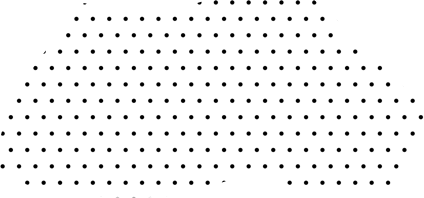When Everything Seems to be Linked
Actually, start with this poem, So Much of the World, by Gregory Djanikian:
So much of the world exists
without us
the mountain in its own steepness
the deer sliding
into the trees becoming
a darkness
in the woods' darkness.
So much of an open field
lies somewhere between the grass
and the dragonfly's drive and thrum
the seed and seedling,
the earth within.
But so much of it lies in someone
standing alone at the edge of a field
with a life apart
feeling for a moment
the plover's cry
on the tongue
the curve and plumb
of the apple bough
in limb and bone.
So much of it between
one thing and another,
days of invitation,
then of release and return.
Doesn't it work beautifully with the little bit about biscuits and eggs and sausage? Don't so many of the most spectacularly beautiful things exist outside us? Or between us? Wherever they live, they're borrowed, spending some fraction of time in our pockets before they run off. Some for a moment, some for a while, and others for good.
I enjoy Kahlil Gibran here:
For in the dew of little things, the heart finds its morning and is refreshed.
A good example: I was sitting in Prospect Park this past weekend and in what must have to be one of the final summer grass-trimmings, a lawn mower nearby was 1) doing it's primary job, of course, but 2) doing my favorite of its secondary jobs: putting in the air that magnificent scent of a grassy baseball field under the Spring-time sun readying itself for play (it's not Spring, of course, but it's a smell that belongs there). That's about as close as I can get to explaining the goosebumps on my arms as my eyes slipped closed and I did that thing that dogs do where they let their nose do all the work. Then off it ran, leaving my pocket until the real Spring comes back around.
Standup, Lesson One: Sometimes you and the audience have different definitions of "funny."
Here's another one: the other Monday, I did some standup comedy at a club in New York. It's one of my favorite things to do -- such an exposing feeling -- and I had one of those moments that exists strictly between the audience and me, and quite the opposite of laughter: I stumbled over my first line and the crowd reacted accordingly. Silently. That used to be such a terrible feeling, but now it actually makes me smile a little bit, and I moved on, my other jokes working picking up the slack of their earlier, more underperforming friends. Not everything has to work, but goodness, I do think that a great deal should be tried. I mean, how else will you know who's down there frying those eggs? How else will you know so much of the world?
Yes, the world encourages specialization, but I have this pinned to my wall -- what do you think?
People often say that I’m curious about too many things at once: botany, astronomy, comparative anatomy. But can you really forbid a man from harboring a desire to know and embrace everything that surrounds him?
This is Alexander von Humboldt, a German geographer and explorer who left Europe on an epic five-year adventure around South America when he was 29. When he returned, he wrote about all he had seen and discovered, and was praised by Darwin, Jefferson, and Bolívar (among others). He wrote this toward the end of his life, a beautiful acknowledgement that his curiosity -- along with his ability to ignore his critics -- fueled his legacy. This scatter-shot of ideas, this indulgence in curiosity and diversity of interest, lies at the heart of Little Hunches. Which, in turn, is very close to the heart of my personal ethos.
That doesn't necessarily mean that life has to be an eternal conquest, or this endless looking-ahead, beyond what we have right now. Indeed, I hope not. That's why it can be balanced with something of a philosophical bent, one that Nietzsche adapts from the age-old Latin notion of amor fati: broadly, the acceptance and love of one's current reality. In a book I read a while ago called A Brief History of Thought, I came across a line that describes this idea with a little more liberty than it's usually given:
To hope a little less, regret a little less, love a little more.
I'm quite ok with this, and also have it pinned to my wall.
The last idea I want to introduce and connect here is that of a fugue, which, in music, refers to a piece in which tunes are repeated in complex patters. It’s a bit more than that: multiple themes are repeated or imitated, voices come and go, and everything is interwoven. Think of it as a beautiful discussion between disparate parts -- the fragments of life that are to be knit up -- or, think of it as the musical version of Little Hunches.
Johann Sebastian Bach’s keyboard fugues are the most notable, but my favorite is not really a fugue at all. In 1967, an English rock band released a song that was derived from the second movement of Bach’s Orchestral Suite No. 3 in D major, or Air on the G String.
Their name was Procol Harum, and their song was A Whiter Shade of Pale -- one of my absolute favorite songs of all time. The other notable influence on it was Percy Sledge’s When a Man Loves a Woman, released a year before on a different continent.
There is the idea that all ideas are borrowed, that everything new is nothing more than a refiguring of all that currently exists. That thought may have merit, but what I enjoy more is seeing the layered connections that exist between so many lovely things, like the poem at the outset. Where else can a Baroque composer, the smell of sausage and eggs, Friedrich Nietzsche, the word fugue, Percy Sledge, and one of the world’s greatest rock songs all find a common link?
How wonderful it is to see the world’s fugue on display, an interweaving of little pieces across time to create many lasting things. May they come and go, staying as long as they like, before they make like the fox from The Little Prince and say a last goodbye.









